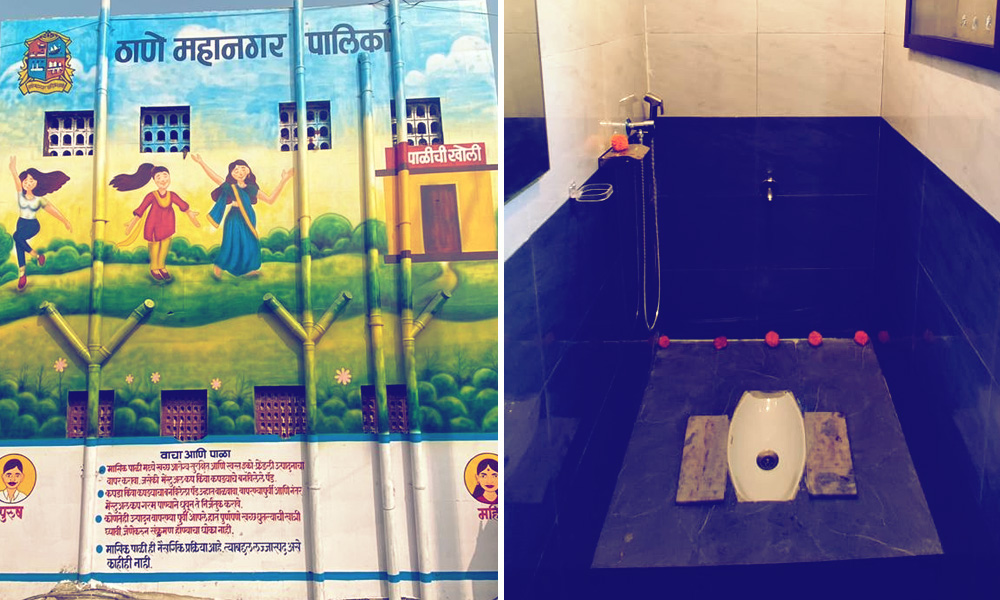
Image Credits: Twitter/ A Period Of Sharing
First-Of-Its-Kind 'Period Room' Set Up For Women In Maharashtra's Thane Slum
Writer: Palak Agrawal
Palak a journalism graduate believes in simplifying the complicated and writing about the extraordinary lives of ordinary people. She calls herself a " hodophile" or in layman words- a person who loves to travel.
Maharashtra, 13 Jan 2021 12:00 PM GMT | Updated 13 Jan 2021 1:29 PM GMT
Editor : Prateek Gautam |
A free soul who believes that journalism, apart from politics, should stand for social cause and the environment.
Creatives : Rajath
A free spirit who find meaning in life with the virtue of creativity and doing job par its excellence, animal lover and traveller by heart.
The 'period room', a separate facility among 10 toilets in the women's section has a urinal, a jet-spray, a toilet roll holder, soap, running water and most importantly —a dustbin that promotes hygienic disposal practices especially during menstruation.
Untidy and overcrowded streets, less-advantaged people, no access to basic sanitation, this is the picture that stands before our eyes when hear, slums. Menstrual hygiene management is luxury, and one cannot expect to come across something like "Menstrual cycle is a natural process, there is nothing to be shameful about it" painted on a brightly-painted wall in a slum.
However, taking note of the day-to-day struggles faced by women and young girls occupying these congested shanties, a 'period room' was constructed in a slum in Maharashtra's Thane city.
The Indian Express reported that a first-of-its-kind facility was set up by the Thane Municipal Corporation in collaboration with an NGO, to cater to the menstrual hygiene needs at a slum in Shanti Nagar locality of Wagle Estate area on Monday, January 4.
The 'period room', a separate facility among 10 toilets in the women's section has a urinal, a jet-spray, a toilet roll holder, soap, running water and most importantly —a dustbin that promotes hygienic disposal practices especially during menstruation.
Reports have suggested that the administration is planning to have such specific-rooms across its public toilets.
"This is a low-cost innovation that took only Rs 45,000. We will replicate this in all our toilets, which would mean a minimum of 120 community toilets," said Deputy Municipal Commissioner Manish Joshi.
In the absence of public toilets for women in most areas, such premises will play a crucial role in not just providing a safe and equipped space for women during periods but also bring a shift in the mindset regarding good hygiene.
Addressing The Issue Head-On
Muse Foundation, the NGO that aided the municipal authorities in coming up with the unique idea and setting up the unit said that it will now work on creating awareness amongst the women slum-dwellers to make use of it.
"We realised that there are no urinals designed for women anywhere. The urinal we have installed in the period room is fashioned out of a washbasin," said NGO founder Nishant Bangera.
In 2019, the organisation had carried out a survey in the 15 slums of Thane and found that of the 1,004 women participants as many as 67 per cent did not have a toilet at home. The survey also highlighted that in the absence of dustbins in public toilets, many women who used them had no option but to dispose of sanitary products any way they could.
Volunteers with the organisation have said that they are going to conduct engagement sessions with the women around the Lokmanya Nagar toilet complex to inform them about the building and the advantages of using it.
30-year-old Mamta Vishwakarma described that most women had a mohri— a small washing area in their houses that is used to change sanitary products but while disposing of the pads, they resorted to doing it in a discreet manner where it escapes the attention of the family members.
"I have not used the period room yet but I am sure it will be very useful, especially for those who don't have a toilet at home," Mamata said.
Dipali Nikam who works as domestic help and has been residing in Lokmanya Nagar for 25 years said took note of how drastically things were changing in the society. Having a separate period room accentuated the need to pay special focus to the period days and to switch to the pads from cloths.
"A few girls have come and seen it. I try and tell them about its benefits if they ask. I told a few other women too," said Jyoti Shinde, the attendant of the toilet block. She also mentioned that keeps tabs on "the things installed in the period room" was one of her primary tasks.
"This is a behavioural change and behavioural changes don't happen very fast. When women who have been changing their sanitary pads at home see this is a better, cleaner place, with water, they will start using it," she explained.
Period Poverty
India is home to over 355 million women, but less than 12% of them have access to sanitary hygiene products.
The term 'period poverty' is used when there is a lack of sanitary products including essentials like toilets with clean water. Besides the absence of lavatories, a lack of awareness on menstruation has also been found to be the reason why adolescent girls refrain from attending schools during the period and instead are home-bound.
The intergenerational stigma causes 'period shame' and has negative mental effects as well. It disempowers women, causing them to feel embarrassed about a normal biological process. Hence it becomes important to normalise menstrual hygiene management practises to ensure a happier and healthier growth.
Also Read: Good News! Women Can Now File Complaints Via WhatsApp In Hyderabad
 All section
All section














